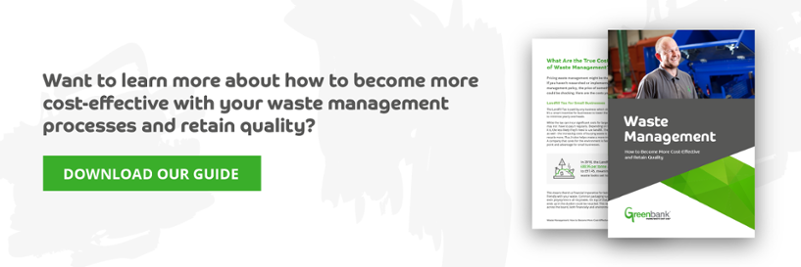Mounting legislative pressure, calls for corporate sustainability and diversifying revenue streams – all important reasons to invest in a top-quality waste management process. As markets and customer behaviour change, implementing an effective waste management system as soon as possible is a wise decision. But why is it a crucial change for businesses?
Let’s explore the importance of investing in your waste management process.
Enhancing Brand Reputation
Buzzwords and phrases such as ‘eco-friendly’, ‘ethical’ and ‘sustainable’ are currently powering key market shifts. Companies that align themselves with these phrases are seen, by consumers, in a much more appealing light, as consumers are more concerned about their emission and waste outputs than ever before.
Customers want to work with businesses that can show a transparent product chain, from sourcing raw materials to dealing with waste. The aim is to make a more ethical and eco-friendly economy – and it’s getting ever easier to do so.
An effective waste management policy that includes recycling, minimised landfill use and sustainable materials works as both an effective means of reducing waste and of marketing.
Essentially, consumer demand is the driving force when it comes to ‘greening’ our business processes. 73% of millennials are wanting to do business with sustainable organisations and are willing to pay more to do so. Because they’re the next generation of buyers and the future stream of reliable revenue, it makes most financial sense to appeal to them.
Brand reputation is a major influence on enhancing your waste management policy, so it makes complete sense to invest in the process and ensure it works for the future. It’s also another way of contributing to the corporate social responsibility your organisation can benefit from.
Retaining Compliance
In light of the UK government’s 25-Year Environment Plan, pressure from legislation to run an efficient waste management process is growing. The Plan itself covers important goals such as eliminating all preventable plastic waste by 2042 and all avoidable waste by 2050.
We’ve already seen stories of plastic straw bans and even recycling programs for crisp packets. On top of that, there are also many government regulations in place that call for effective waste management. For example, if a business is sending waste to landfill, it must pay the Landfill Tax, which is currently set at £94.15 per tonne.
Disposing of waste, moving it, storing and treating it – there are regulations for each of these, as well as a myriad of other processes. If you’re not investing in the compliant techniques for managing waste, you could be at risk of being non-compliant with these regulations.
For example, fly-tipping is a common problem in the UK and the consequences are serious. Fines can be a £400 fixed penalty notice or there could even be jail time involved. By remaining compliant, you’re fulfilling the environmental obligations put in place by the government.
Improving Cost-Effectiveness
It’s no secret that when an effective waste management policy is employed company-wide, it can lead to a positive increase in the overall revenue. By managing our waste, lowering the amount we produce and recycling, we can reap the financial benefits.
These benefits revolve around a reduction in costs associated with off-site waste disposal, less costs spent on labour and the ability to create a new source of profit.
There are a number of cost-effective benefits – let’s focus on three of them.
Less Waste Equals Less Landfill Costs
First of all, lowering the amount of waste you produce means there’s less you have to get rid of. Commercial waste goes to landfill and we’ve already stated it now costs nearly £100 per tonne of waste. Depending on how much waste you produce annually, this can add up to a significant amount.
Lowering Spends On Labour
Investing in an effective waste management process and lowering the size and amount of waste you produce means less time and money spent on labour. This means waste transportation, disposal and any contractual work will be less of a tax on your bottom line.
Create a New Revenue Stream From Your Waste
Due to modern advancements in recycling and waste management machinery, we see waste as a potential resource and revenue generator. For example, many people think that polystyrene is unable to be recycled – this isn’t the case and there’s a real financial incentive for investing in the machinery to undertake recycling polystyrene.
There’s increasing demand for polystyrene blocks from the construction industry and the market for polystyrene is set to reach £29.43 billion by 2027. If you invest in the right sort of machinery that’s able to recycle polystyrene, such as polystyrene compactors, you’ll be able to create another revenue stream by selling your waste product.
The importance of waste management isn’t worth denying. Maintaining a cost-effective waste management policy and remaining compliant is becoming more and more crucial, so it’s worth exploring the best methods of doing so.
Explore Cost-Effective Waste Management Methods Today
To find out what you can be doing to reduce your working costs while managing your waste, download our eBook. ‘Waste Management: How to Become More Cost-Effective and Retain Quality’ explains all the ways a small business can implement an efficient and compliant waste management process. By putting these methods in place, you can take the steps needed to become more cost-effective and sustainable while remaining compliant.
Click on the link below to get your own copy.





